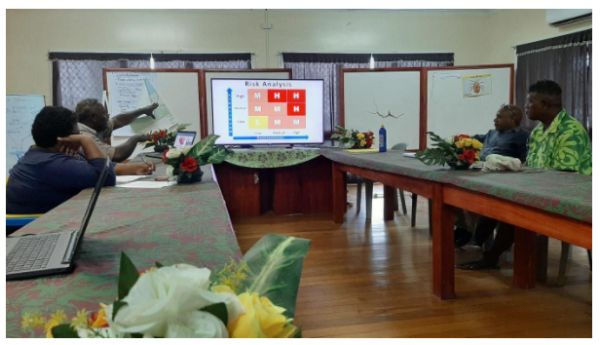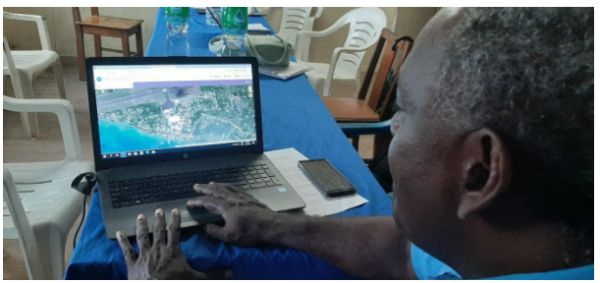Developing Resilient Model Farms To Improve Nutrition In Provincial Areas
The Solomon Islands Government through the Ministry of Agriculture and Livestock (MAL) has hosted a two-day workshop with key government stakeholders in Honiara recently, to design agricultural model farms that will strengthen community resilience and enhance livelihoods.
Held from 16-17 September at the MAL office, the workshop brought together representatives from MAL, the Ministry of Health and Medical Services (MHMS), the Ministry of Women, Youth, Children and Family Affairs (MWYCFA) and the Ministry of Environment, Climate Change, Disaster Management and Meteorology (MECDM) Geographical Information Systems (GIS) Unit to contribute to a risk screening exercise for proposed model farms in six provinces.
The collective expertise of participants ensured that the design of the farms considers the health and agriculture requirements, potential natural hazards and importantly the differing strengths and needs and of all users, including (but not limited to) women, men, youth, elderly and people with disabilities.
“This integrated approach to designing the model farms ensures that they are sustainable, more productive and better meet community’s needs. We need to acknowledge risks which might impact the success of the farms in each province, and design management measures to mitigate these,” said Sipuru Rove, the Chief Field Officer, MAL Western Province. Rove added “if farming in communities is more risk informed and productive, the reliance on imported goods can also decrease which is an additional economic benefit.”
From a health perspective, Aloysius Vakeke, the Chief Health Promotion Officer, MHMS Guadalcanal Province, said “Solomon Islands has been found to have very high rates of malnutrition, and pressure on food security has enhanced since COVID-19. The model farms will support communities by improving the diversity and nutrition of their crops. They will be located in areas which have the highest rate of nutritional disorders in each province, so will address some of the priority areas in relation to health.”
The participants also identified that it is important to consider people’s differing needs at an early stage of any project, to make sure it is accessible and beneficial to everyone in the community.
Following the completion of the workshop, the MAL will finalise the risk informed design for each of the sites and start establishing the farms before the end of the year. Once the farms have been constructed, MHMS and MAL will deliver training that will include guidance on nursery establishment, seed saving, preservation, crop nutrition and hygiene, and demonstrations to farmers at each site over the next three years.
The workshop is supported by the UNDP Pacific Office in Fiji through the Governance for Resilient Development in the Pacific (Gov4Res) Project and the UNDP Solomon Islands Office in Honiara.




 ITUC: Trade Unions In Action Against Gender-based Violence - 16 Days Of Activism
ITUC: Trade Unions In Action Against Gender-based Violence - 16 Days Of Activism 350.org: Climate Movement Holds Steadfast As Wealthy Nations Fail To Deliver On Climate Finance At COP29
350.org: Climate Movement Holds Steadfast As Wealthy Nations Fail To Deliver On Climate Finance At COP29 COP29: Statement From COP29 Presidency
COP29: Statement From COP29 Presidency UN News: ICC Issues Arrest Warrants For Netanyahu, Gallant And Hamas Commander
UN News: ICC Issues Arrest Warrants For Netanyahu, Gallant And Hamas Commander RNZ: Samoan Local Upset With Lack Of Manawanui Updates
RNZ: Samoan Local Upset With Lack Of Manawanui Updates Pacific Whale Fund: Groundbreaking Whale Rights Law Inspired By Māori King's Legacy To Be Unveiled In London
Pacific Whale Fund: Groundbreaking Whale Rights Law Inspired By Māori King's Legacy To Be Unveiled In London